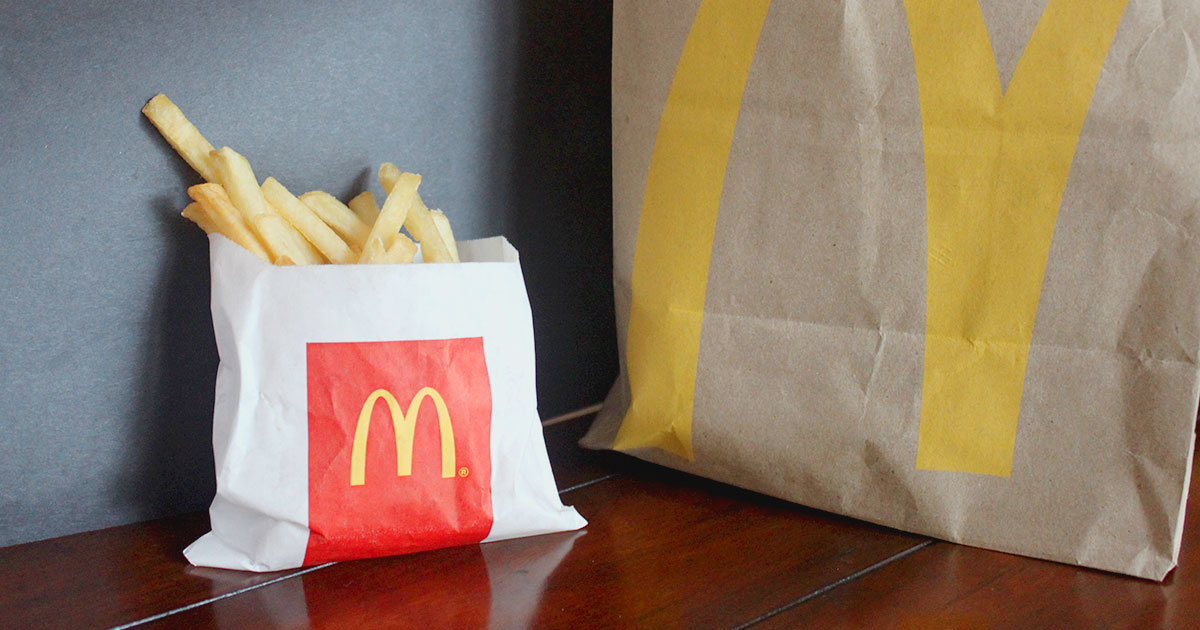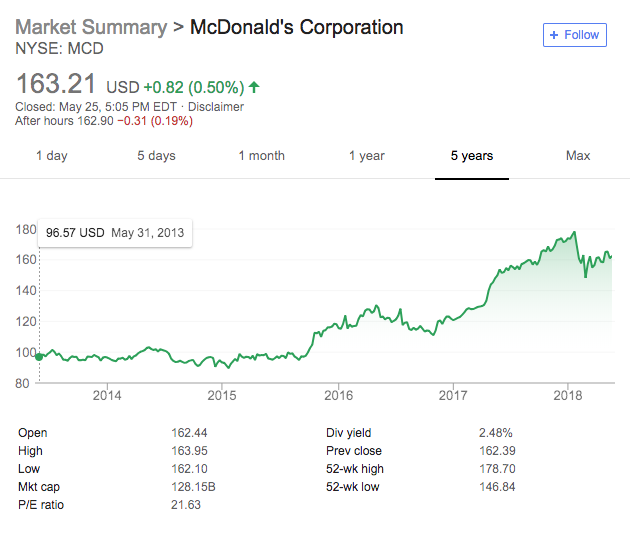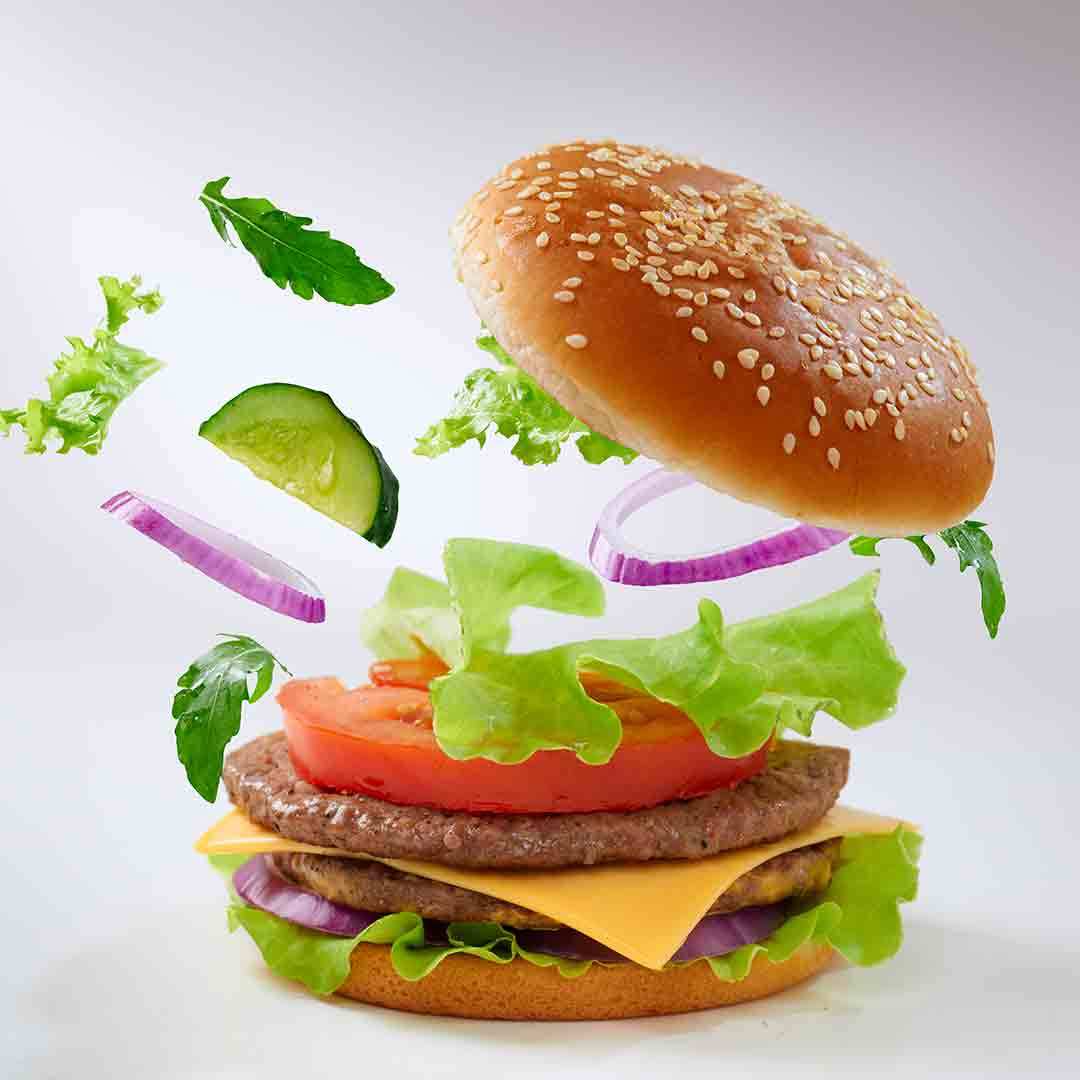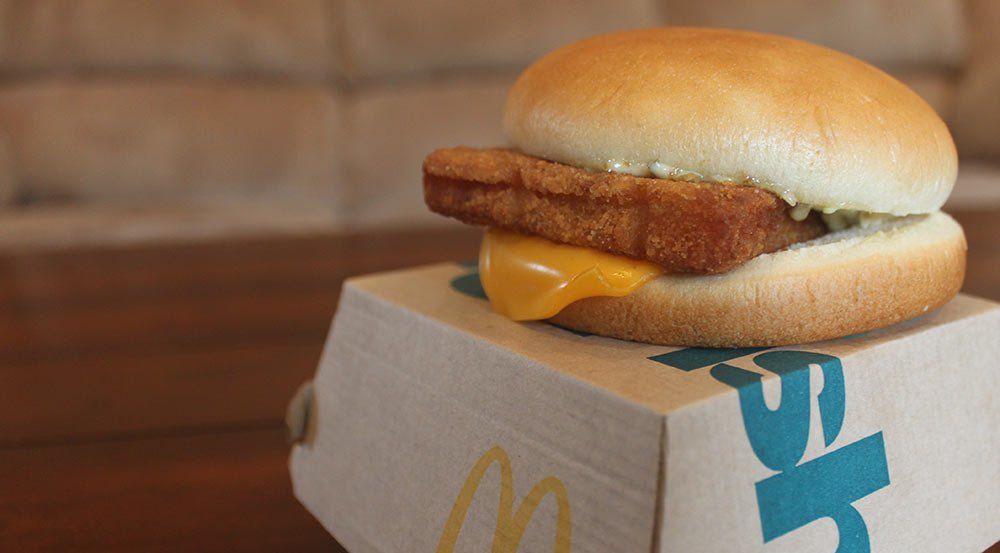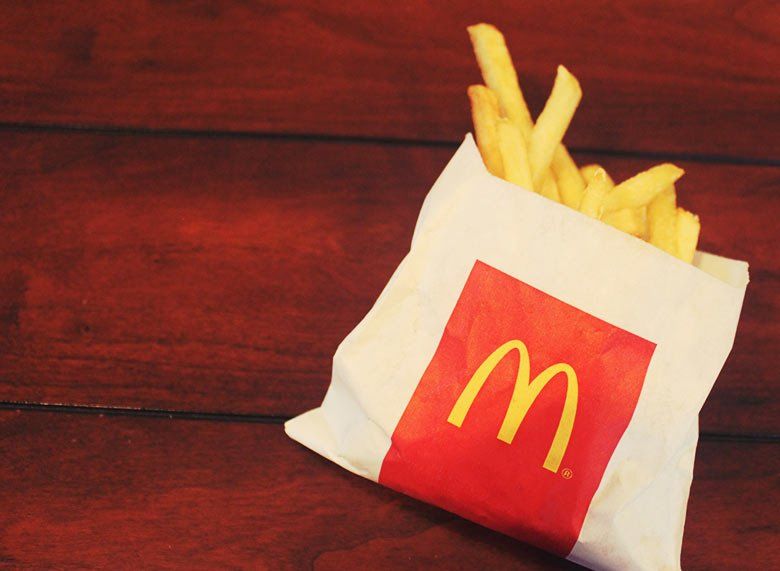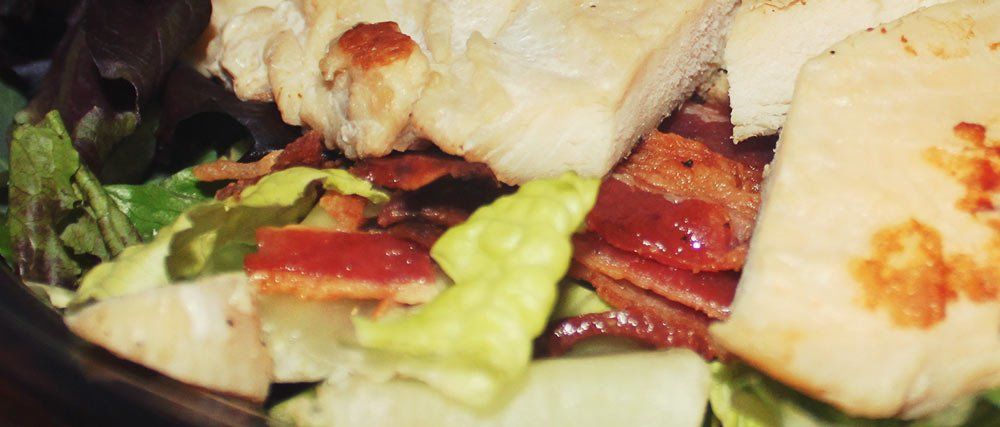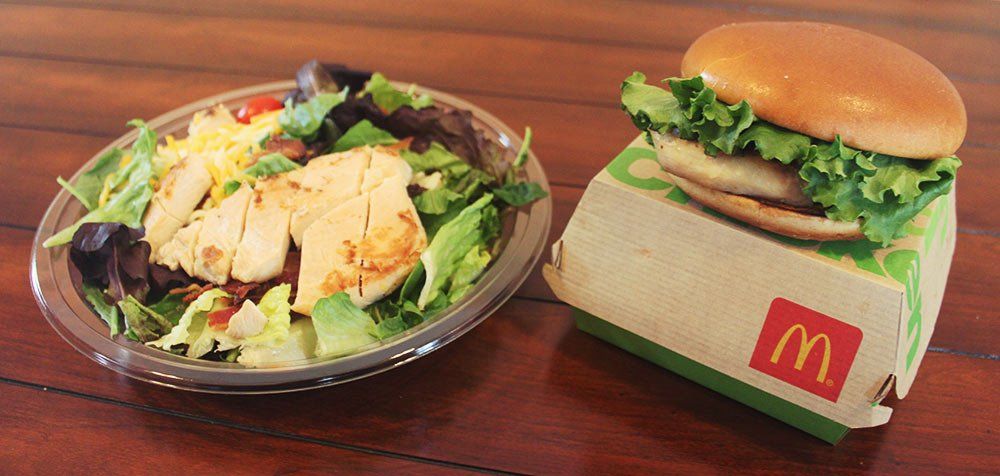McDonald’s ingredients are bad for you. Everyone knows that. My work is done here…
Or do they?
In the last couple of years, McDonald’s has made a major push to make itself a more healthy option. This has created a huge turnaround for a brand that was on the ropes.
This resurgence, through actual menu changes and marketing, has McDonald’s stock at 5-year highs in 2018.
So are these changes legit? Is McDonald’s a truly healthy alternative? Or is it just more of the same, with a better marketing campaign?
McDonald’s Food as a Healthy Choice
I’ve never associated McDonald’s with health or fitness, but lately, they’re painting themselves as being a healthy choice. Their website portrays food much like pharmaceutical commercials. The imagery of a young beautiful couple walking a pristine beach… and I still don’t get the correlation on the latter.
There was so much attention on the use of a few particular ingredients and their “mummy-like” ability to preserve food for years that the spotlight has been removed from a very important point. If you’re trying to stay fit, lean, heart-healthy or just feel good, their food is most certainly not the answer.
I don’t want you to get the idea that you can achieve the goals you’re after by consuming their food. You won’t, period.
McDonald’s Campaign to Improve Their Image
McDonald’s has made a massive push over the last decade to improve their ingredients and portray themselves as a healthy choice for dining out.
Mentioned earlier, it’s clear if you look at their website, they’re promoting transparency by placing their ingredients front and center as well as showcasing the delightful images of their chef’s and Registered Dietitians on staff.
But bottom line, McDonald’s sells a product, and moving that product is the number one goal of the organization. Not the health of the nation. Keep that in mind!
I honestly believe they’re trying to pick up a new market of individuals who want to believe they’re eating healthy or at least making a “better” choice (regardless of whether they are or not).
One More Thing to Keep in Mind
Chemical names that are foreign to us tend to scare us into believing it’s dangerous. If you were not aware that ethanoic acid (CH3COOH) was one of the chemical names for vinegar, it might alarm you to see it listed as an ingredient.
But now they’re using fresh beef for their burgers….
Well, this just makes everything better…. Or does it?
The last I checked, freezing meat had no impact on its nutritional value. So now more energy and money is spent on transportation and storage to deliver you the same product.
Ultimately, you’re consuming the same meat without the freezing process. BIG DEAL! This does not make it any more healthy. Who knows, perhaps it tastes better. But that’s not the point of their campaign. They lost market share and now want to change their image to get it back.
But please don’t be fooled into believing you’re all of a sudden eating a healthy meal at McDonald’s.
A Questionable Ingredient Recently Removed
Azodicarbonamide: It was used as a dough conditioner in bread, but because of controversy, it was removed from McDonald’s ingredients in their bread.
Ingredients of Some Popular Items on McDonald’s Menu
The questionable to bad ingredients are highlighted and then discussed individually below.
McDonald’s Fish Ingredients:
Pollock, Water, Vegetable Oil (Canola Oil, Corn Oil, Soybean Oil, Hydrogenated Soybean Oil), Wheat Flour, Modified Food Starch, Contains 2% or Less: Yellow Corn Flour, Bleached Wheat Flour, Salt, Whey (Milk), Dextrose, Dried Yeast, Sugar, Cellulose Gum, Paprika and Turmeric Extract (Color), Natural Flavors.
McDonald’s Bun Ingredients:
Enriched Flour (Wheat Flour, Malted Barley Flour, Niacin, Iron, Thiamine Mononitrate, Riboflavin, Folic Acid), Water, Sugar, Yeast, Soybean Oil, Contains 2% or Less: Salt, Wheat Gluten, Potato Flour, May Contain One or More Dough Conditioners (DATEM, Ascorbic Acid, Mono and Diglycerides, Enzymes), Calcium Propionate (Preservative)
McDonald’s Cheese Ingredients:
Milk, Cream, Water, Sodium Citrate, Cheese Cultures, Salt, Color Added, Sorbic Acid (Preservative), Citric Acid, Lactic Acid, Acetic Acid, Enzymes, Soy Lecithin.
McDonald’s French Fry Ingredients:
Potatoes, Vegetable Oil (Canola Oil, Corn Oil, Soybean Oil, Hydrogenated Soybean Oil, Natural Beef Flavor [Wheat and Milk Derivatives]*), Dextrose, Sodium Acid Pyrophosphate (Maintain Color), Salt. *Natural beef flavor contains hydrolyzed wheat and hydrolyzed milk as starting ingredients.
McDonald’s Chicken Tender Ingredients:
Boneless Skinless Chicken Breast Strips, Wheat Flour, Vegetable Oil (Canola Oil, Corn Oil, Soybean Oil, Hydrogenated Soybean Oil), Water, Salt, Leavening (Baking Soda, Sodium Acid Pyrophosphate), Potato Starch, Spices, Rice Starch, Sugar, Rice Flour, Corn Starch, Garlic Powder, Yellow Corn Flour, Onion Powder, Buttermilk, Citric Acid, Natural Flavor, Maltodextrin, Xanthan Gum.
McDonald’s Chicken Nugget Ingredients:
White Boneless Chicken, Water, Vegetable Oil (Canola Oil, Corn Oil, Soybean Oil, Hydrogenated Soybean Oil), Enriched Flour (Bleached Wheat Flour, Niacin, Reduced Iron, Thiamine Mononitrate, Riboflavin, Folic Acid), Bleached Wheat Flour, Yellow Corn Flour, Vegetable Starch (Modified Corn, Wheat, Rice, Pea, Corn), Salt, Leavening (Baking Soda, Sodium Aluminum Phosphate, Sodium Acid Pyrophosphate, Calcium Lactate, Monocalcium Phosphate), Spices, Yeast Extract, Lemon Juice Solids, Dextrose, Natural Flavors.
McDonald’s Bacon Ingredients:
Pork Bellies Cured with Water, Salt, Sugar, Natural Smoke Flavor, Sodium Phosphate, Sodium Erythorbate, Sodium Nitrite
McDonald’s Hotcake Ingredients:
Water, Enriched Flour (Wheat Flour, Niacin, Reduced Iron, Thiamine Mononitrate, Riboflavin, Folic Acid), Whey, Corn Flour, Soybean Oil, Sugar, Eggs, Leavening (Baking Soda, Sodium Aluminum Phosphate, Monocalcium Phosphate), Dextrose, Emulsifier (Mono and Diglycerides, Propylene Glycol Monoesters of Fats and Fatty Acids, Sodium Stearoyl Lactylate), Salt, Xanthan Gum, Natural Flavors, Beta Carotene (Color), Soy Lecithin
McDonald’s Shake Ingredients:
Milk, Sugar, Cream, Corn Syrup, Natural Flavor, Mono and Diglycerides, Cellulose Gum, Guar Gum, Carrageenan, Vitamin A Palmitate
Perceived or Real Problems with Questionable Ingredients?
Dextrose:
Elicits an insulin response similar to consuming white potatoes. The only detrimental effect (other than sugar is unhealthy, period) is the sustained elevation of glucagon. Glucagon helps elevate blood glucose levels by signaling the liver to release more stored glucose. This is a counterproductive situation.
Unhealthy
Hydrogenated Soybean Oil:
We’re all well aware that chemically altering an oil to make it more saturated has serious adverse effects on heart health by lowering high-density lipoproteins (HDL) and elevating low-density lipoproteins (LDL).
Unhealthy
Sodium Acid Pyrophosphate:
Is currently used by the sausage industry to accelerate the development of cured meat color. It is also added to prevent the growth of some pretty nasty bacteria. The concern with this particular ingredient is that there is evidence that both the high intakes and the poor balance of intake with other nutrients may place individuals at risk of kidney disease, bone loss, cardiovascular disease, and other chronic health conditions. Some information was based on studies of people already in end-stage renal failure, so I discount this one. But, there is real evidence that a diet high in pyrophosphates can lead to the above mentioned chronic health issues.
Unhealthy
Sodium Nitrite:
Excess intake has been linked with cancer.
Unhealthy in large amounts
DATEM (diacetyl tartaric esters of monoglycerides):
Improves loaf volume and dough stability in breads.
Neutral
My Perspective on Eating at McDonald’s
A lot of the food available in grocery stores is full of the same ingredients as McDonald’s foods and you have a choice at the grocery store just like you do with restaurants. What bothers me the most is McDonald’s campaign to make you think you’re making a healthy decision by going to their restaurant.
Who am I kidding… many of the products in the grocery store make the “healthy claim”. But are actually poor choices for good health.
I’m less concerned about all of the questionable ingredients and more concerned by the poor combinations of saturated fats and high glycemic sugars and starches. None of it is “heart healthy” and I assure you it will not contribute in a positive way to your ideal body image or health.
Simply put, combining the high glycemic foods with the saturated fats elevates insulin levels enough to force the fats into storage instead of being burned for energy.
Another concern is the sodium level in a lot of their foods. I understand that it is a big factor in preserving the food, but it also contributes to the flavor more than we realize.
Not every person is sodium sensitive. Regardless, this level of sodium intake is, by all means, detrimental to heart health due to elevated blood pressure.
Why All the Preservatives?
This is a question that piqued my curiosity since their food is typically consumed immediately after purchase. Much of the food is shipped frozen, which would eliminate the need for heavy preservatives.
But, I can imagine decisions made at the corporate level when weighing the liability concerns of either too many preservatives or the potential for spoilage, shrink (throw away) and food poisoning outweighs the concerns of the use of preservatives. Make sense?
That is, of course, my educated guess.
Your Kids and Eating at McDonald’s

Also, children who frequently consume McDonald’s type foods develop a taste for foods high in sodium, saturated fats and sugar. The exact opposite of what you might hope for your child.
If we make poor choices for our kids, they will most likely make poor choices about food themselves going forward. I’m no stranger to the difficulties of food selection for kids as I have two of my own. For the record, they’ve never been inside a McDonald’s.
My Time Working at McDonald’s
Yes, believe it or not, I worked at McDonald’s during my early teen years. But I don’t regret it. I learned an awful lot about managing systems, which I was able to apply to my own businesses as I grew.
What do I remember most? “You got time to lean, you got time to clean.” Also, McDonald’s is the master of systemizing every component of business, making every aspect of running that business dummy proof.
As far as the food is concerned, I always made the observation that it seemed ridiculously processed (and this was in 1987). I seriously doubt the processing and preservation techniques have changed too much in the interim.
If There Are No Other Options, What are Healthy Choices at McDonald’s?
Here’s a good question.
If you’re traveling, in a pinch, need food and there’s no grocery store around, then here are a few alternatives at McDonald’s that will hold you over without killing your goals.
- Bacon ranch grilled chicken salad (fine if your carbohydrate intake is super low)
- Artisan grilled chicken sandwich minus the bread (not so filling though)
Yeah, that’s about all I would suggest.
What is a Better Alternative to Eating at McDonald’s
Okay, so if you’re traveling and you need something to eat, why not Google the local grocery store and pick up some cottage cheese and an avocado.
When I used to travel the east coast via motorcycle (pre-kids), we always grabbed meals in grocery stores. It was always cheaper and healthier with a larger selection to boot.
Conclusions on McDonald’s Ingredients
If you’re reading this blog, then I’m certain you’re a person who is concerned about your health. You’re probably well aware that Mcdonald’s is a poor choice for maintaining good health. It’s easy to get fixated on a few bad ingredients that receive press coverage for being carcinogenic or contributors to heart disease, etc., but I think we’re missing the point.
Too many of us lose our minds over ingredients with strange names. Meanwhile, we make other poor choices that will have a far greater impact on our health in a negative way. Just a few examples include sleeping too little, consuming a lot of fruit juices, not exercising, etc. You get the point.
McDonald’s is not a good choice if you’re concerned about your overall health or aesthetics, period!
Your Thoughts?
So what are your thoughts on the new McDonalds?
Do you use them as a quick meal?
Do you see them as a more healthy alternative?
What will you do the next time you need a meal in a pinch?
Leave a comment below and let us know your thoughts.
Research and Resources on McDonald’s Ingredients and Effects – (NERD STUFF)
Alfonso Valenzuela and Nora Morgado, Trans fatty acid isomers in human health and in the food industry, SciElo, Biol. Res. v.32 n.4 Santiago 1999
Mona S. Calvo, Alanna J. Moshfegh, Katherine L. Tucker; Assessing the Health Impact of Phosphorus in the Food Supply: Issues and Considerations, Advances in Nutrition, Volume 5, Issue 1, 1 January 2014, Pages 104–113
P A Crapo, O G Kolterman, N Waldeck, G M Reaven, J M Olefsky; Postprandial hormonal responses to different types of complex carbohydrate in individuals with impaired glucose tolerance, The American Journal of Clinical Nutrition, Volume 33, Issue 8, 1 August 1980, Pages 1723–1728.
P A Crapo, J Insel, M Sperling, O G Kolterman; Comparison of serum glucose, insulin, and glucagon responses to different types of complex carbohydrate in noninsulin-dependent diabetic patients, The American Journal of Clinical Nutrition, Volume 34, Issue 2, 1 February 1981, Pages 184–190,
Mona S Calvo, Jaime Uribarri; Public health impact of dietary phosphorus excess on bone and cardiovascular health in the general population, The American Journal of Clinical Nutrition, Volume 98, Issue 1, 1 July 2013, Pages 6–15
R.Walker; Toxicology of sorbic acid and sorbates: Symposium papers—The chemistry and uses of sorbic acid in food, 16 Mar 1990, Pages 671-676.
William M. Vollmer, PhD; Frank M. Sacks, MD; Jamy Ard, MD; Lawrence J. Appel, MD; George A. Bray, MD; Denise G. Simons-Morton, MD, PhD; Paul R. Conlin, MD; Laura P. Svetkey, MD; Thomas P. Erlinger, MD; Thomas J. Moore, MD; Njeri Karanja, PhD; for the DASH-Sodium Trial Collaborative Research Group; Effects of Diet and Sodium Intake on Blood Pressure: Subgroup Analysis of the DASH-Sodium Trial, Annals of Internal Medicine, 2001;135(12):1019-1028.

